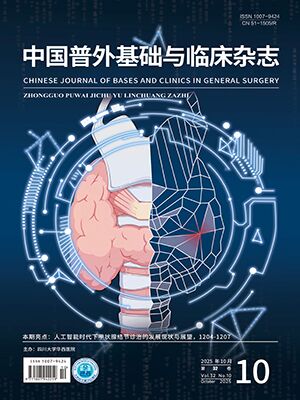| 1. |
中国临床肿瘤学会指南工作委员会. 中国临床肿瘤学会(CSCO)分化型甲状腺癌诊疗指南2021. 肿瘤预防与治疗, 2021, 34(12): 1164-1200.
|
| 2. |
Vaccarella S, Dal Maso L, Laversanne M, et al. The impact of diagnostic changes on the rise in thyroid cancer incidence: a population-based study in selected high-resource countries. Thyroid, 2015, 25(10): 1127-1136.
|
| 3. |
Sung H, Ferlay J, Siegel RL, et al. Global cancer statistics 2020: GLOBOCAN estimates of incidence and mortality worldwide for 36 cancers in 185 countries. CA Cancer J Clin, 2021, 71(3): 209-249.
|
| 4. |
中华医学会内分泌学分会, 中华医学会外科学分会甲状腺及代谢外科学组, 中国抗癌协会头颈肿瘤专业委员会, 等. 甲状腺结节和分化型甲状腺癌诊治指南(第二版). 中华内分泌代谢杂志, 2023, 39(3): 181-226.
|
| 5. |
胡小春, 王叶, 刘可. 多发性骨髓瘤患者复发恐惧与社会支持的相关性研究. 当代护士(下旬刊), 2022, 29(3): 9-13.
|
| 6. |
谢莉, 毛敏, 李雯, 等. 癌症复发恐惧在中青年淋巴瘤患者家庭功能与创伤后成长间的中介效应研究. 重庆医科大学学报, 2023, 48(7): 824-830.
|
| 7. |
吕德平, 肖会能, 杨玉玲, 等. 甲状腺术后患者应激与社会支持水平的影响因素及相关性分析. 中外医学研究, 2023, 21(13): 98-102.
|
| 8. |
翁艳翎, 陈晓侠, 宋文静, 等. 甲状腺癌术后病人生活质量的研究进展. 护理研究, 2022, 36(9): 1616-1619.
|
| 9. |
张阳, 程春燕, 崔盼盼, 等. 乳腺癌患者癌症复发恐惧现状及其影响因素分析研究. 中国全科医学, 2018, 575(20): 2479-2483.
|
| 10. |
Baloch ZW, Asa SL, Barletta JA, et al. Overview of the 2022 WHO classification of thyroid neoplasms. Endocr Pathol, 2022, 33(1): 27-63.
|
| 11. |
中华人民共和国国家卫生健康委员会. 甲状腺癌诊疗规范(2018年版). 中华普通外科学文献(电子版), 2019, 13(1): 1-15.
|
| 12. |
林卫, 蒋宵宵, 孔祥东, 等. 心理疏导护理对分化型甲状腺癌患者生存质量的影响. 山西医药杂志, 2021, 50(16): 2477-2479.
|
| 13. |
钱连连, 刘海强, 李红强. 甲状腺外科手术患者自尊、社会支持调查及影响因素. 中国健康心理学杂志, 2021, 29(11): 1655-1661.
|
| 14. |
曾玲, 王倩, 於赵悦, 等. 以格林模式为指导的健康教育在分化型甲状腺癌术后患者中的实施效果. 护理实践与研究, 2023, 20(6): 895-900.
|
| 15. |
陆敏建, 韦小梅, 刘鑫. 分化型甲状腺癌131I隔离治疗患者癌症进展恐惧现状及影响因素分析. 中国临床护理, 2022, 14(9): 575-579.
|
| 16. |
王雪平, 崔玉顺. 脑卒中病人疾病进展恐惧的研究进展. 全科护理, 2023, 21(19): 2644-2647.
|
| 17. |
Ming J, Zhu JQ, Zhang H, et al. A multicenter, prospective study to observe the initial management of patients with differentiated thyroid cancer in China (DTCC study). BMC Endocr Disord, 2021, 21(1): 208.
|
| 18. |
Wang T, Jiang M, Ren Y, et al. Health-related quality of life of community thyroid cancer survivors in Hangzhou, China. Thyroid, 2018, 28(8): 1013-1023.
|
| 19. |
葛婧, 祝安然, 孙彩霞, 等. 甲状腺癌病人术后随访需求的质性研究. 全科护理, 2023, 21(21): 3009-3013.
|
| 20. |
Goldfarb M, Casillas J. Thyroid cancer-specific quality of life and health-related quality of life in young adult thyroid cancer survivors. Thyroid, 2016, 26(7): 923-932.
|
| 21. |
林素芳, 曹雅婕. 分化型甲状腺癌患者术后癌症复发恐惧现状及其影响因素分析. 临床医学工程, 2022, 29(5): 729-730.
|
| 22. |
Rogers SN, Mepani V, Jackson S, et al. Health-related quality of life, fear of recurrence, and emotional distress in patients treated for thyroid cancer. Br J Oral Maxillofac Surg, 2017, 55(7): 666-673.
|
| 23. |
柳月仙, 陈艳华, 柴娜, 等. 成人急性淋巴细胞白血病患者复发恐惧的影响因素及与社会支持的相关性研究. 现代生物医学进展, 2022, 22(8): 1552-1556.
|
| 24. |
黄颖慧, 包龙, 黄若琳, 等. 甲状腺癌患者疾病感知及对生活质量的影响研究. 中西医结合护理, 2021, 7(2): 54-60.
|




